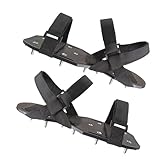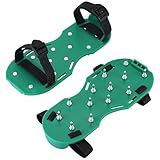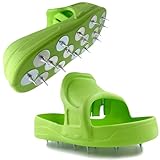Imagine spending eight hours on your knees, moving heavy tools, and walking across freshly laid flooring. Does your back ache? Do your feet throb? For flooring installers, the right footwear is not just about comfort; it’s a critical piece of safety and efficiency gear. Many installers simply wear old work boots, but these often lack the specific features needed for this tough job.
Choosing the wrong shoes can lead to painful blisters, slips on slick surfaces, and even long-term joint issues. You need footwear that protects your feet but also keeps your knees and back safe during repetitive bending and kneeling. Finding that perfect balance between rugged protection and flexible support feels like searching for a needle in a haystack.
This guide cuts through the confusion. We will break down exactly what makes a shoe ideal for flooring installation—from necessary grip to crucial cushioning. By the end of this post, you will know the top features to look for and which styles keep you comfortable, safe, and productive all day long. Let’s dive into finding your perfect pair of work shoes.
Top Shoes For Flooring Installers Recommendations
- Note: Please Check Your Shoes Size Before Purchasing
- Universal Size: FOR US ADULT SHOE SIZES US(men 6-11), US(women 4-11.5). The bottom of the epoxy spike shoe is 11.8*5.1 inches, with adjustable straps can accommodate all ordinary shoes, sports shoes or work boots. Note: Not suitable for sizes above 12 or thick work boots as your toes will extend beyond the spike shoe sole, and then recommended to purchase our large-size 13.4*5.2 inches
- Epoxy Spike Shoes: In the self-flowing flat paint construction, wearing epoxy resin nail shoes will return and stick back will not leave a trace, provide excellent balance while walking on the surface, making them ideal for use during construction when working with epoxy resin, concrete, painting, gunite, and so on. They will prevent your shoes from sticking and remove air bubbles during application, while also protecting the surface from footprints
- Fully Assembled:What you receive will be fully assembled spike shoes, do not want to spend effort and time to assemble. you only need to tie your shoelaces and you can use them directly. Epoxy spike shoe also come with a free small wrench. Easy to install and remove. Epoxy nail shoes are a necessary tool for self-leveling, epoxy flooring and overlay construction.
- Anti-slip Nuts: FIETODK epoxy shoes use nylon locking nuts to firmly fix the 13 short nails on the shoe plate, the short nails and the shoe plate are tightly connected to each other, without leaving a gap. Avoid loosening or falling off during use to ensure the safety of your work
- Universal Sizing: No heel restrictions,There are multiple holes on the bottom plate, fits all foot sizes and shoe types, adjustable for comfort.Extended straps, suitable for safety shoes
- No Assembly Required: Pre-assembled nails and straps save time and prevent errors, up to 15 minutes saved.
- Ergonomic Design: Maintains proper balance, enhances body stability, prevents falls or twisted ankles.
- Durable & Lightweight: Made with high-strength nylon material for durability, comfort, and long-lasting use.
- improve quality:Upgraded the strength of the shoe board and adopted nuts to prevent loosening
- ✔Epoxy Spike Shoes: In self-flowing flat paint construction, wearing epoxy resin nail shoes will prevent tracks and ensure your design remains intact. Epoxy nail shoes are essential for self-leveling, epoxy flooring, and overlay construction.
- ✔Easy to Assemble: This Epoxy Floor Kit features two snap-lock buckle belts for secure fastening and 13pcs specially placed sharp-tip 1-inch spikes per shoe.
- ✔Anti-slip Nuts: These epoxy shoes use locking nuts to firmly fix the 13 short nails on the shoe plate, ensuring a tight connection without gaps. This prevents loosening or falling off during use, ensuring work safety.
- ✔Universal Size: The bottom of the epoxy spike shoe measures 12*5.1 inches, with adjustable straps to accommodate ordinary shoes, sports shoes, or work boots. Note: Not suitable for sizes larger than 12 yards.
- ✔Professional Design for Epoxy Flooring: Spike shoes with 3/4" short spikes (length after assembly) are perfect for epoxy floor installations, cement self-flow, overlays, and other mulch applications.
- 【Essential for Epoxy Floor Work】Designed for self-leveling, epoxy coating and overlay construction applications, these spiked shoes allow you to walk on wet epoxy without leaving footprints, help eliminate bubbles in the epoxy material—ensuring a flawless finish and improved work efficiency.
- 【Durable & Secure Construction】This epoxy shoes each features 2 snap-lock buckle belts for secure fastening and 13pcs sturdy 1.1''/28mm steel spikes firmly locked with nylon lock nuts, preventing loosening or falling off during use. The solvent-resistant polypropylene base plate provides long-lasting support and durability.
- 【Reliable Performance】1.1''/28mm short spikes are perfect for epoxy floor installation, cement self-flow and other overlays, cover application, also can be used to aerate your lawn. The epoxy floor spiked shoes maintain a stable center of gravity, not being too high or too low off the ground. When you walk in the epoxy shoes, please keep your balance to prevent from tipping over or breaking your foot.
- 【Quick Assembly】Includes a free mini wrench for fast and easy spike installation. All you need to do is tighten the screws with the included wrench, lace up the shoes and you're ready to go to work.
- 【Universal Fit with Adjustable Straps】Measuring 11.8"/30cm x 5.1"/13cm, these gunite spiked shoes fit US adult shoe sizes 6–12. Two adjustable straps keep the shoes firmly in place over sneakers, work boots, or other footwear. Not suitable for sizes above 12 or bulky boots.
- SAFE EPOXY FLOOR SPIKE SHOES - Leweio spikes shoes feature steel nails that are precisely positioned around the base, provide excellent balance while walking on the surface, making them ideal for use during construction when working with epoxy resin, concrete, painting, gunite, and so on. They will prevent your shoes from sticking and remove air bubbles during application, while also protecting the surface from footprints.
- STURDY METAL PLATE+INNOVATIVE NUT LOCK DESIGN - Unlike other spike shoes that use a plastic base that can easily break and cause nuts to fall off, our shoes are built to last with their sturdy aluminum alloy plate and innovative nut lock design. The soft leather touch fasteners and laces provide a double insurance system to securely wrap around your shoes, preventing any accidents or mishaps during your work.
- ONE SIZE FIT ALL - Our Epoxy Floor Spiked Shoes are crafted with unbreakable black soft leather and feature an 11.8*5.1 inch aluminum alloy base plate with 26 anti-corrosive steel nails, providing you with a and reliable platform for your work. The laces on the shoes can be easily adjusted to fit over regular shoes, sneakers, work boots and any other shoes, ensuring a comfortable and snug fit during use.
- FULLY ASSEMABLE - Our Gunite Spiked Shoes come ready to use straight out of the box. Each shoe features 13 heavy-duty steel anti-corrosive and spikes, already assembled and ready to go. Simply tie your shoelaces and slip them on for a secure and comfortable fit. For added convenience, our shoes also come with a small wrench, making installation and removal quick and easy.
- LEWEIO TEAM - Our Epoxy Floor Spiked Shoes are designed to help you spike roll, concrete work, or apply chips or colored aggregate to wet epoxy floors. If you encounter any issues with your Epoxy Shoes, please let us know, There will be 24*7 to assist you with any questions or concerns you may have.
- Standard: Unisex size, flexible use, easy to wear for men and women. length: 12"; width: 5".
- Durable: Constructed of durable, solvent-resistant polypropylene, strong structure, reliable performance.
- Combination: Features a snap-lock buckle system and 13 specially placed, sharp-tip 1 inch spikes per shoe.
- Widely Used: 1" Short spikes is perfect for epoxy floor installation, and other overlays, cover application.
- Package Contains: 4 Pair black color spiked shoes. Enjoy a smooth & frustration free experience.
- Quick On and Off – Simply step in and out — no straps or buckles. Ideal for fast transitions during epoxy garage floor coating kit applications.
- Strap-Free Convenience – Slip-on design fits right over your shoes for hassle-free use. Perfect for pros and DIYers handling epoxy floor paint or garage epoxy work.
- Enhanced Stability – Built-in spikes deliver reliable grip on wet epoxy floor surfaces to help prevent slips and ensure a flawless finish.
- Flexible Movement – Engineered for comfort while standing, bending, or kneeling—great for long hours spent on epoxy garage projects.
- Comfortable Fit – Worn directly over your existing footwear, these epoxy shoes eliminate the need for changing shoes between tasks.
- Versatile Professional Footwear: engineered for diverse applications, these epoxy spike shoes excel in tough environments; They're ideal for work tasks involving resin coatings, floor leveling materials, and a variety of epoxy applications
- Enhanced Safety Assurance: designed with anti-slip and strong grip feature, these epoxy shoes perform well on various surfaces; This stability significantly reduces accident risks, allowing users to concentrate on their tasks with an added sense of security
- Comfort Size and Extend Use: crafted in size XL, these spike shoes for epoxy flooring prioritize user comfort, suitable for shoe size 11-16, fitting naturally to reduce fatigue during 8+ hour shifts; They also keep debris at bay, ensuring a comfortable working environment
- Even Pressure Distribution: these heavy-duty epoxy floor shoes reinforce iron spikes properly arranged to ensure even pressure distribution, providing a stronger grip, ensuring instant slip resistance on wet, oily, or freshly coated floors
- Practical Professional Gift Idea: these epoxy spiked shoes make a nice gift for anyone needing trustworthy footwear in a professional setting; They offer practicality and reassurance, catering to individuals who prioritize safety and resilience in their work attire
Choosing the Right Shoes for Flooring Installation
Flooring installers spend long hours on their feet. They also work on various surfaces. The right shoes make a big difference. Good shoes protect your feet. They also help you work better. This guide will help you pick the best footwear for your job.
Key Features to Look For
When buying shoes for flooring work, look for several important things. These features help keep you safe and comfortable all day long.
1. Excellent Support and Cushioning
Your feet need good support. Flooring work involves a lot of standing and bending. Look for shoes with strong arch support. Good cushioning absorbs shock. This reduces strain on your knees and back. Think of it like a good mattress for your feet.
2. Slip Resistance
Flooring materials can be slippery. Dust, adhesives, or smooth subfloors create hazards. Shoes must have excellent slip-resistant outsoles. This keeps you steady and prevents dangerous falls. Always check the tread pattern; deeper grooves usually mean better grip.
3. Durability and Protection
Flooring work can be rough. Tools drop. Sharp debris might be on the floor. Shoes need tough outer materials. A reinforced toe area is a big plus. This protects your toes from accidental impacts. The shoe must also resist punctures from small nails or screws.
4. Non-Marking Soles
This is crucial, especially when working on finished floors or light-colored materials. Non-marking soles will not leave scuffs or dark streaks behind. Installers must keep the worksite clean. Non-marking soles help maintain a professional finish.
Important Materials Matter
The materials used determine how long the shoes last and how comfortable they feel.
Outsole Materials
Rubber is the most common outsole material. High-quality, dense rubber offers the best grip and wear resistance. Polyurethane (PU) soles are often lighter. They provide good shock absorption but might wear down faster than heavy-duty rubber.
Upper Materials
Uppers should balance protection and breathability. Full-grain leather offers the best durability and water resistance. However, synthetic meshes or durable textiles can make the shoe lighter and cooler. Many modern work shoes use a mix of leather and tough synthetic fabric.
Midsole Components
The midsole is between the insole and the outsole. EVA (Ethylene Vinyl Acetate) foam is very common. It offers excellent lightweight cushioning. Some premium shoes use specialized foam or even lightweight steel shanks for extra stability when walking on uneven surfaces.
Factors That Improve or Reduce Quality
Quality is often seen in the small details of construction.
What Improves Quality?
- Stitching Quality: Double or triple stitching on high-stress areas means the shoe will not fall apart easily.
- Removable Insoles: This lets you swap out the standard insole for custom orthotics if you need extra support.
- Waterproofing: If you work with wet materials or in damp basements, a waterproof barrier is essential.
What Reduces Quality?
- Glued Soles: Shoes where the sole is just glued on tend to separate quickly under heavy stress.
- Thin Padding: Shoes with very thin, cheap foam padding lose their support after only a few months of hard use.
- Heavy Weight: While protection is key, overly heavy shoes cause fatigue quickly. Good quality finds a balance between protection and manageable weight.
User Experience and Use Cases
Different flooring jobs require slightly different shoe focuses.
For **Carpet Installers**, flexibility is important. They often kneel and move quickly. A slightly lighter, more flexible shoe works well here. **Hardwood and Tile Installers** need maximum protection. They often handle heavy tools and sharp edges. A steel or composite toe is highly recommended for these users.
Overall, the best user experience comes from a shoe that feels broken-in right away. Since new work boots often need time to soften, try them on at the end of the day when your feet are slightly swollen. A good fit prevents blisters and long-term foot problems.
10 Frequently Asked Questions (FAQ) About Flooring Installer Shoes
Q: Do I need a safety toe (steel or composite)?
A: It depends on the job. If you frequently drop heavy items like tile boxes or tools, yes, a safety toe protects your feet from serious injury.
Q: Are regular sneakers okay for light flooring work?
A: No. Regular sneakers lack the necessary support, puncture resistance, and heavy-duty outsoles required for construction environments.
Q: How often should I replace my work shoes?
A: For full-time installers, expect to replace them every 6 to 12 months, depending on how fast the soles wear down.
Q: What is the difference between slip-resistant and non-marking soles?
A: Slip-resistant means the shoe grips the floor well. Non-marking means the rubber will not leave dark scuff marks on light floors.
Q: Should I wear thick socks with these shoes?
A: Yes. Wear moisture-wicking, slightly padded work socks. They help manage sweat and add a small layer of comfort inside the shoe.
Q: Can I use my old hiking boots for flooring?
A: Hiking boots offer good support, but their soles might be too aggressive and could damage delicate subfloors or leave deep marks.
Q: Are waterproof shoes necessary for installers?
A: They are very helpful if you work in basements or handle adhesives that might splash. They keep your feet dry.
Q: What should I do if the shoe feels too tight?
A: If it is tight in width, look for a “Wide” size option. If it is too short, you must size up; never try to stretch a shoe that is too small.
Q: How important is the weight of the shoe?
A: Weight is very important for all-day comfort. Lighter shoes reduce leg fatigue significantly over an eight-hour shift.
Q: Where is the best place to purchase these specialized shoes?
A: Buy them from a reputable workwear store or an online retailer that specializes in safety footwear. They usually offer better fitting advice and quality brands.








